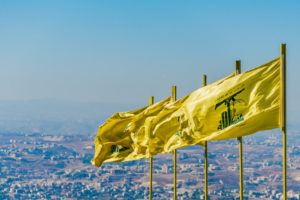International Community Must Constrain Hezbollah to Protect Israel and Civilians

iStock.com/ Credit:shmooj
The use of human shields is among the most heinous violations of international law – and a favored tactic of Hezbollah, as recent events have once again illustrated.
An arms depot belonging to the Shiite terrorist group exploded in a southern Lebanese house on September 22, a week before the Israeli military identified three Hezbollah missile sites in Beirut. Two were underneath residential buildings where dozens of families live, and another near two gas companies and a gas station.
Hezbollah and Human Shields
Hezbollah’s use of human shields during the 2006 Lebanon War and the ensuing years has been well-documented.
Indeed, the Israel Defense Forces (IDF) has assessed that “one-quarter to one-third of the buildings in most […] Southern Lebanese villages are at the service of Hezbollah military apparatus.”
Between 2018-19, the IDF found multiple Hezbollah attack tunnels that penetrated Israeli territory – the largest of which started in a home in southern Lebanon. This summer, an Israeli research center identified 28 Hezbollah missile sites in Beirut, including near schools and hospitals.
Why does Hezbollah endanger civilians so flagrantly? The calculus is as clear as it is cruel.
By illegally positioning weapons among civilians, Hezbollah hopes to raise the cost of – and potentially deter – retaliation by Israel, which seeks to avoid civilian casualties. If a strike is carried out, Hezbollah would still benefit by leveraging any casualties to erode the legitimacy of Israeli operations in the public arena.
For instance, Hezbollah’s placement of military targets among civilians during the 2006 conflict led to various diplomatic criticisms and public protests against Israeli strikes. In many ways, it deflected media and public attention from Hezbollah’s responsibility for Lebanese casualties, its attacks against Israeli civilians, and its culpability in launching the war.
Most importantly, such pressures can also help reign in or even force a premature end to operations against Hezbollah, heightening the likelihood of future conflict.
Hezbollah’s Advance
Unfortunately, in the event of another Hezbollah war, the destruction in both Israel and Lebanon will be much greater.
Despite the United Nation’s calls for Hezbollah’s disarmament, the Iranian proxy has increased its rocket and missile arsenal since 2006 by tenfold, to some 130,000 today. These weapons are deployed across Lebanon, meaning the damage from IDF airstrikes will be extensive.
Hezbollah has also developed precision-guided missiles – a force multiplier that will let it use one or two missiles, instead of 10 or 15, to hit Israeli critical infrastructure sites with devastating consequences.
Hezbollah’s leader pointedly warned in 2016 that he could cause damage equivalent to a nuclear bomb with only “a few missiles” by hitting strategic targets, like an ammonium tank in Haifa that has since been relocated.
While Iron Dome can protect Israeli civilians from some Hezbollah attacks, the system is costly and not infallible. If Hezbollah is not prevented from firing thousands of missiles each day, Israel’s air defense systems could be overwhelmed and its civilians and critical infrastructure severely endangered.
Israeli decision-makers will have to carefully consider this when determining how to neutralize Hezbollah’s massive threat to the Israeli home front.
Hezbollah is unlikely to provoke such a conflict imminently. Yet its escalation with Israeli forces in July shows that tensions remain high and could, at Iran’s command, erupt into broader hostilities. Any opportunities to potentially avert this crisis must be taken immediately.
Exposing Hezbollah’s Abuses
As anger against Lebanon’s rulers continues building following the Beirut port explosions, Hezbollah’s abuses – like its use of human shields – should be forcefully and continually exposed.
The US and other concerned nations, particularly France, should raise the alarm among the Lebanese people against Hezbollah’s arms build-up and the threat it poses to their families.
European powers can aid this effort by comprehensively banning Hezbollah, joining an international consensus led by the US and the Arab League. This would also help counter Hezbollah’s fundraising activities in the European Union at a pivotal time – just as the group reckons with Lebanon’s financial meltdown, the coronavirus pandemic, and crushing sanctions on itself and Iran.
There should likewise be greater efforts to counter and expose Hezbollah’s increasing reliance on drug smuggling and other criminal operations, which can further erode the group’s religious legitimacy.
International donors must simultaneously leverage any long-term aid to constrain Hezbollah. Forcing reforms that encourage transparency and accountability by the Lebanese state will invariably hurt the group, which benefits from the corrupt status-quo.
Aid should also be used to improve access to welfare programs among Shiites, whose support Hezbollah has courted by offering social services.
The world is obligated to help free Lebanon from the clutches of this ruthless Iranian proxy. Another war between Israel and Hezbollah would take a heavy human and economic toll on the already beleaguered Lebanese people, with whom Israel has no quarrel. Thousands of lives hang in the balance, but there is still time to act. Don’t let it slip by.
IDF MG (ret.) Yaacov Ayish is a former Israeli Defense Attaché to the United States and Canada, and former head of the IDF General Staff Operations Branch. He is Senior Vice President for Israeli Affairs at the Jewish Institute for National Security of America (JINSA).
Originally published in The Defense Post